七年级英语上册Unit6Doyoulikebananas单元知识解读方案课件(新版)人教新目标版
合集下载
七年级英语上册 Unit 6 Do you like bananas课件 (新版)人教新目标版

Jack: Hey, John’s birthday dinner is next week. Let’s think about the food.
Tom: Sure. How about burgers, vegetable salad, and some fruit?
Bill: Sounds good. John likes hamburgers.
Unit 6 Do you like bananas?
This is a fridge (冰箱).
What’s in the fridge?(猜猜冰箱里有什么?) some Vegetables ['vedʒtəbl]
fridge
some fruits
half an apple
an apple
three apples
milk, bread, rice
可数名词 (countable noun):
apple ---- apples pear ---- pears hamburger --- hamburgers banana ---- bananas orange ---- oranges strawberry --- strawberries tomato ---- tomatoes carrot ---- carrots French fries – French fries
3. oranges __f__
4. ice-cream __h__
5. salad
__b__
6. bananas __g__
7. strawberries __c__
8. pears
__j__
9. milk
___e_
10. bread
Tom: Sure. How about burgers, vegetable salad, and some fruit?
Bill: Sounds good. John likes hamburgers.
Unit 6 Do you like bananas?
This is a fridge (冰箱).
What’s in the fridge?(猜猜冰箱里有什么?) some Vegetables ['vedʒtəbl]
fridge
some fruits
half an apple
an apple
three apples
milk, bread, rice
可数名词 (countable noun):
apple ---- apples pear ---- pears hamburger --- hamburgers banana ---- bananas orange ---- oranges strawberry --- strawberries tomato ---- tomatoes carrot ---- carrots French fries – French fries
3. oranges __f__
4. ice-cream __h__
5. salad
__b__
6. bananas __g__
7. strawberries __c__
8. pears
__j__
9. milk
___e_
10. bread
人教版七年级上Unit6_Do_you_like_bananas)课件

1. Write down the conversation(2c) between your and your partner.
2. Write a report according to the survey.
Unit 6 Do you like bananas
Aims and Language points:
2. -Let’s think about the food.
-Sure.
-让我们想想(吃什么)食物吧。 -当然。/没问题
think about “对…有(某种观点); 回想起;考虑”
Eg. You can think about it. 你可以把这事考虑一下。
Sure.
What do you think about him? 你觉得他这人怎么样?
中用助动词does。 疑问句和否定句中用到does后,谓语动词用原形(like).
Let’s chant
Join us, join us. Let’s have a party. Do you like salad ? Yes, I do. Do you like bread ? No, I don’t. Does he like apples ? Yes, he does. Does she like pears? No, she doesn’t. Do they like hamburgers? Yes, they do. I see. I see. Let’s have a party.
Do you like …?
Names
tomatoes
ice-cream
hamburger s
2a.Listen and circle the food. (Students’ Book Page 32)
七年级英语上册 unit 6 do you like bananas单元知识解读方案课件

C left at home.
Go and buy some, dear.
A.carrots B.potatoes
C.rice
解析(jiě xī): 句意:家里没有大米了。去买一些吧,亲爱的。
carrots是可数名词复数;potatoes是可数名词复数;rice是 不可数名词。 little修饰不可数名词。故选C。
解析:photo的复数形式是photos,potato的复数形式是
potatoes; many和lots of后可跟可数名词复数。句意:—— 那里有许多关于农场(nóngchǎng)的画。——是的,许多土豆种 植在农场(nóngchǎng)上。
12/8/2021
第十九页,共三十一页。
5.(2016·湖南怀化(huái huà)中考,24)—Mom, I'm hungry. May I
have some
A?
—Sure. But don't eat too much.
A.hamburgers
ks
C.cake
解析:句意:——妈妈,我饿了。我可以吃些?——当 然了。但是不要吃得太多。hamburgers意为“汉堡包”; milk意为“牛奶”;cake意为“蛋糕”。some后跟不可 数名词或可数名词复数(fùshù)形式,milk是不可数名词, 没有复数(fùshù)形式;cake是可数名词。故选A。
3.It's a pity that only two
like best were recorded.
piece(spiece) of music that I
4.Her
(act) tell us a lot about her purpose.
人教版七年级英语上册七年级英语Do_you_like_bananas课件
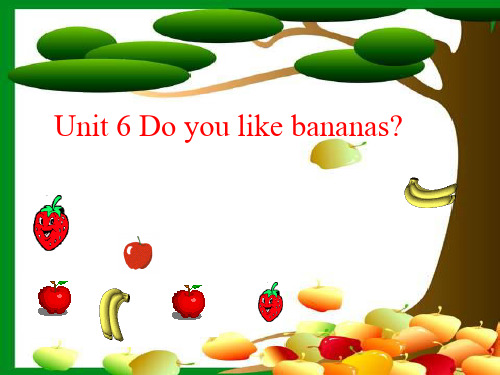
apples
1.----__B__
you
Check yourself
like bananas?
-----Yes, I do.
A. Does B. Do C. Are D. Is
2.----Do you like hamburgers?
----______A______.
A. No, I don’t. B. Yes, I likes.
5. I like ice cream (改为否定句). ___I___ __d_o_n_’_t like ice cream.
6. Do you like bananas?(作否定回答) __N__o__, ____I__ ___d_o_n_’_t .
任务型阅读
根据材料,请找出Jim Green 为家人准备的晚餐,并填写表格。
Class 8,Grade 1 Nov 25,2004
Groupwork: How many other words can you add to the lists?(四人一组写出其它单词, 可用词典,看哪组写得最多)
fruits
apples,
vegetables broccoli,
breakfast
Unit 6 Do you like bananas?
an apple apples
chicken
carrot s
an egg eggs
Look at the pictures for 2 minutes, then say the food words.(看图两分 钟,说出食物名称)
_______, You are today’s king of words.
some salad
1.----__B__
you
Check yourself
like bananas?
-----Yes, I do.
A. Does B. Do C. Are D. Is
2.----Do you like hamburgers?
----______A______.
A. No, I don’t. B. Yes, I likes.
5. I like ice cream (改为否定句). ___I___ __d_o_n_’_t like ice cream.
6. Do you like bananas?(作否定回答) __N__o__, ____I__ ___d_o_n_’_t .
任务型阅读
根据材料,请找出Jim Green 为家人准备的晚餐,并填写表格。
Class 8,Grade 1 Nov 25,2004
Groupwork: How many other words can you add to the lists?(四人一组写出其它单词, 可用词典,看哪组写得最多)
fruits
apples,
vegetables broccoli,
breakfast
Unit 6 Do you like bananas?
an apple apples
chicken
carrot s
an egg eggs
Look at the pictures for 2 minutes, then say the food words.(看图两分 钟,说出食物名称)
_______, You are today’s king of words.
some salad
人教版七年级上册英语Unit6 Do you like bananas 单元课件 (共57张PPT)
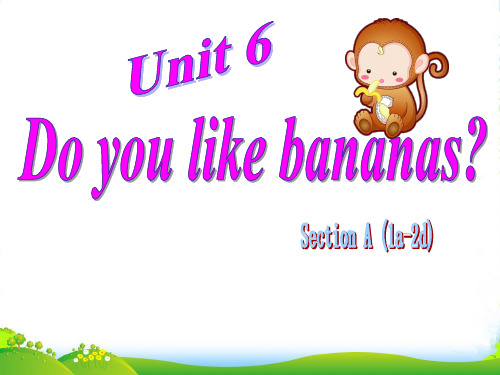
tomatoes oranges strawberries
pears
hamburgers bananas
Game: Who has the best eyes? 谁的眼睛最亮?
1a Match the words with the things in the
picture.
1. hamburgers d 2. tomatoes i
3b
Number these sentences [1 - 4] to make a conversation.
?
Make your own conversations in pairs.
so: 英语口语中常用的语气词,相当于汉 语中的“于是,那么,这样一来”,其承 上启下的作用。
Practice the conversation above. Give answers that are true for you.
Apple round ,apple red.
苹果圆,
苹果红
Apple juicy ,apple sweet.
苹果多汁, 苹果甜
Apple apple I love you.
苹果苹果 我爱你
Apple sweet I love to eat.
苹果甜甜
我爱吃
What’s the song about?这首歌关于什么?
A: I like …. Do you like…? B: No, I don’t. C: Let’s have… D: Sounds good. (No, I don’t like it.)
Unit 6 Do you like bananas
Section B 1a:
1
新版七年级上册英语Unit6 Do you like bananas?PPT
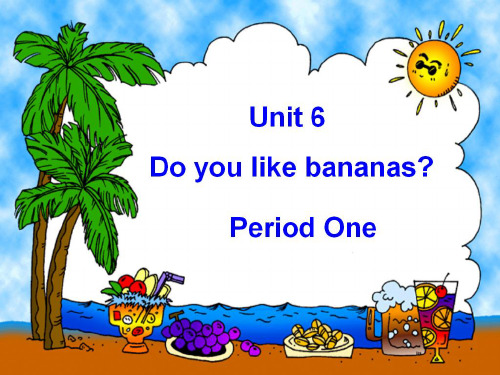
salad
bananas
Countable nouns Uncountable Countable and
nouns
uncountable
nouns
hamburgers,
eggs, oranges, bananas,
milk, bread, rice
apples ,pears,
carrots, vegetables,
food, fruit, ice-cream, salad, chicken
tomatoes,
strawberries
bananas
pears
strawberries
eggs
tomatoes oranges
hamburgers
apples
carrots
salad
chicken
ice cream
fruit
Yes , he does . No , he doesn’t .
Does __sh__e_ like salad ?
Yes , she does . No , she doesn’t .
Check yourself
1.----_B___ you like bananas?
ห้องสมุดไป่ตู้
-----Yes, I do.
改f或fe为v 再加-es
-ves读[vz]
knives wives
可数名词复数形式的构成 2
名词特点 词尾加法 词尾读音方法
例词
以辅音字母 改y为i 再 加y结尾的 加-es
-ies读[iz]
families dictionaries
以元音字母
加y结尾的
人教版七年级英语上册教学课件:Unit 6 Do you like bananas(共90张PPT)
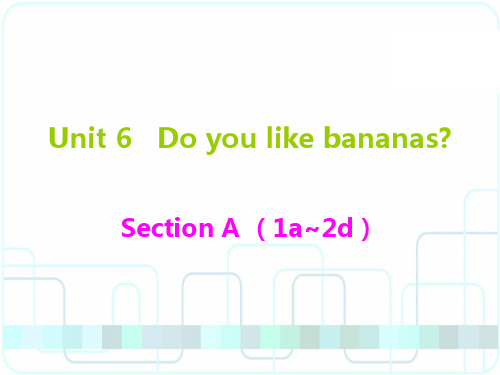
课堂练习
三、根据汉语意思完成句子,每空一词 1. 你喜欢草莓吗? Do you ___li_k_e__ ___s_tr_a_w_b__e_rr_ie_s___? 2. ——你喜欢苹果吗? ——不,我喜欢梨。 —Do you __li_k_e__ __a_p_p_le_s_? —No, I __d_o__n_'t__. I __li_k_e__ __p_e_a_r_s__.
Unit 6 Do you like bananas?
Section A (1a~2d)
课前导学
核心单词 1. ___b_a_n_a_n_a____ n. 香蕉 2. ____h_a_m_b_u_r_g_e_r____ n. 汉堡包 3. ____t_o_m_a_t_o____ n. 西红柿 4. ___i_c_e_-c_r_e_a_m____ n. 冰激凌 5. ____s_a_l_a_d___ n. 沙拉 6. __s_t_r_a_w_b_e_r_ry____ n. 草莓 7. ____p_e_a_r____ n. 梨 8. ____m_i_lk______ n. 牛奶
要点梳理
2. sure的用法 【教材例句】—Let's think about the food. 让我们来 想想(吃什么)食物吧。 —Sure. 当然。 (教材第32页) 【要点思维导图】
要点梳理
【举例】 —Can you help me? 你能帮我吗? —Sure. 当然可以。 I am sure he can come to my birthday party. 我确信 他会来参加我的生日聚会。
要点梳理
2 句型“How about …?”的用法 【教材例句】How about burgers, vegetable salad, and some fruit? 汉堡包、蔬菜沙拉和一些水果怎么样? (教材第32页) 【用法】“How about …?”意为“(提出建议)…… 怎么样?”,用于提出建议或请求,相当于“What about …?”,其中about为介词,后接名词、代词或 动词-ing形式。
人教新目标七年级英语上册Unit6Doyoulikebananas课件共19张
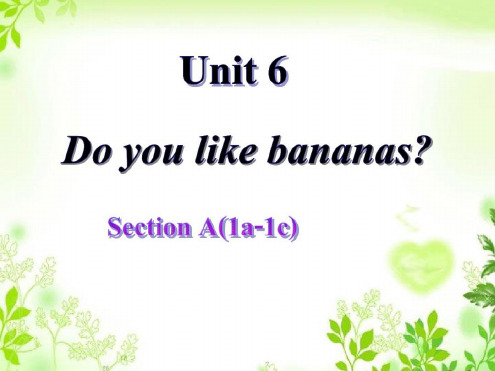
hamburger
salad
ice cream
milk bread
第一步 :交流学习—环节1. 师友朗读
.
banana ice cream orange
tomato
bread
hamburger
milk
pear
salad
strawberr y
第二步:环节1 导入新知识
可数名词与不可数名词
请注意:可数名词有单数和复数两种形式,即 以用a/an 来引导,也可以在词尾+s 或 es .
( ) 3. — Do you like oranges? — Yes, ______ . A. I does B. I do C. I don't
( ) 4. I ______ like salad. A. don't B. am C. is
( ) 5. I have three ______ . A. pear B. strawberrys C. strawberries
I like
I don't like
第三步:学习对话 环节2 : 教师点拨 引入新的句型
Do you like …?
Yes, I do. / No, I don ' t.
环节2 : 根据自己实际情况进行问答。
tomato es
eg : A:Do you like tomatoes? B:Yes , I do ./ No, I don't.
bread
A:Do you like bread? B:Yes , I do ./ No, I don't.
第四步:拓展提高 环节1.师友检测
一、单项选择题。
- 1、下载文档前请自行甄别文档内容的完整性,平台不提供额外的编辑、内容补充、找答案等附加服务。
- 2、"仅部分预览"的文档,不可在线预览部分如存在完整性等问题,可反馈申请退款(可完整预览的文档不适用该条件!)。
- 3、如文档侵犯您的权益,请联系客服反馈,我们会尽快为您处理(人工客服工作时间:9:00-18:30)。
加-es
以“元音字母+o” radio—o—zoos
语法知识(二):实义动词的一般现在时 实义动词的一般现在时有两种形式:be动词和实 义动词。我们之前学习了含系动词be的肯定句、否定 句和疑问句,也学习了实义动词have的一般现在时句 式,本单元我们又学习了实义动词like的一般现在时 态,现将实义动词的一般现在时的句式结构总结如
在t后,一起读/ts/;在
d后,一起读/dz/
box—boxes
ch结尾的名 watch—watches 读/Iz/
词,加-es
class—classes
以f或fe 结尾的名 词,要变 f或fe为v, 再加-es 以“辅音字母+y”
knife—knives
half—halves
family—families
故选C。
4.—There are many —Yes, lots of A.photo; potato C.photos; potatoes
定义
表示可以计数 表示不可以计数的事物的
特点
但是可以用在“量词+of+不
可数名词”的结构中
可数名词单数作主 不可数名词作主语
语时,谓语动词用 时,谓语动词常用
谓语动 单数;可数名词复 单数;“量词+of+
词的数
数或多个单数可数 不可数名词”结构
名词作主语时,谓 作主语时,谓语动
语动词用复数
词与量词的数一致
4.表示“有点喜欢”的用语
He likes noodles a little.他有点喜欢面条。
5.表示“不喜欢的”用语 I don’t like chicken.我不喜欢鸡肉。 6.询问某人早饭、午饭、晚饭喜欢吃什么的句型 What do you like for breakfast/lunch/dinner?你早饭/ 午饭/晚饭喜欢吃什么? 7.询问情况或征求意见的句型
2.(2016· 贵州铜仁中考,24)—What would you like to eat? —Some A A.bread , please. B.cake C.coffee D.tea
解析:句意:——你想要吃点什么?——请来一些 面包。咖啡和茶是饮料,排除C、D;cake是可数 名词,被some修饰时应该用复数形式,排除B。故 选A。
下:
语法专练
一、单项选择
1.(2016· 云南昆明中考,26)Each couple in China can have two A.boy C from January 1st, 2016. C.children D.child B.girl
解析:句意:中国从2016年1月1日开始每对夫妇 可以有两个孩子。数词two后面接可数名词复数, 四个答案中只有C项是可数名词复数。故选C。
【注意】 1.可数名词也可以用于“量词+of+可数名 词”结构。如:a bag of tomatoes一袋西红柿 2.有些名词既可以作可数名词,也可以作不可数名 词。在句中为可数名词还是不可数名词,要根据句 意而定。如: oranges(可数名词,橙子)—orange(不可数名词,橙
汁)
fishes(可数名词,鱼的种类)—fish(不可数名词,鱼
How/What about going to the zoo?去动物园怎么样?
【重点单词及短语复习自测】 1.food; bread; rice; egg; hamburger; chicken; salad2.vegetable; tomato; carrot; potato3.fruit; apple; pear; orange; strawberry; banana4.breakfast;
肉)
【助记】 可数名词与不可数名词的区别 名词可数不可数,一分为二辨清楚;两半都可叫原 名,不可数名词可判定;每半已无整体性,该词可 数最公平。
类别 一般直接在 名词末尾加 -s 以 s, x, sh,
例词
读音规则 在清辅音后读/s/;在
desk—desks
map—maps
浊辅音和元音后读 /z/;
读/vz/
结尾的名词,要变
y为i加-es 以“元音字母+y”
dictionary—dictionaries
boy—boys monkey—monkeys
读/Iz/
结尾的名词,要直
接加-s
读/z/
以“辅音字母+o”
结尾的名词,多数
tomato—tomatoes 读/z/
potato—potatoes
UNIT 6 Do you like bananas 单元知识解读方案
重点单词及短语复习自测 1. 食物→ 鸡蛋→ 沙拉 2. 3. 蔬菜→ 西红柿→ 苹果→ 胡萝卜→ 梨→ 橙子 面包→ 汉堡包→ 米饭→ 鸡肉→
土豆
水果→
→
草莓→
香蕉
4.
三餐→
晚饭
早饭→
6.健康的食物 8.听起来不错 10.吃得好
3.(2016· 海南中考,30)There's little home. Go and buy some, dear. A.carrots B.potatoes
C
C.rice
left at
解析: 句意:家里没有大米了。去买一些吧,亲 爱的。carrots是可数名词复数;potatoes是可数名 词复数;rice是不可数名词。 little修饰不可数名词。
午饭→
5.饮食习惯 7.思考;思索 9.体育明星
实用句型
1.询问某人是否喜欢某物的句型
Do you like hamburgers?你喜欢汉堡包吗? 2.表示“最喜欢”的用语 She likes tomatoes best.她最喜欢西红柿。 3.表示“非常喜欢”的用语
I like hamburgers very much.我非常喜欢汉堡包。
lunch; dinner5.eating habits6.healthy food7.think
about8.sound good9.sports star10.eat well11.after
dinner12.be fat
13.ask sb. about sth.
语法知识(一):可数名词与不可数名词 分类 可数名词 的事物的名词 名词 有单。复数形 式之分 不可数名词没有复数形式, 不可数名词
